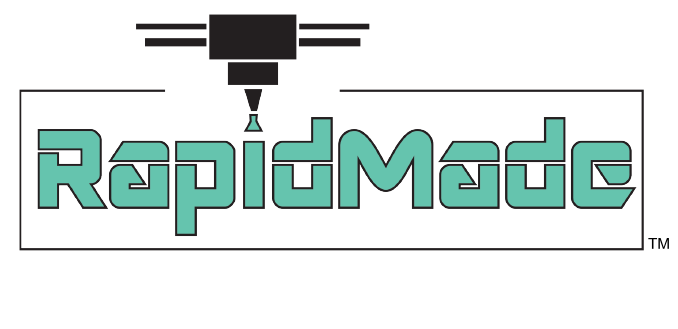When we talk about 3D printing, it is a catch-all phrase that encompasses several distinct technologies, each with its own strengths. Here are some comparisons of additive manufacturing options in plastic, metal and composites:
3D Printed Plastics
Fused Deposition Modeling (FDM)
Learn more about FDM
Standard Materials: ABS
Relative Cost: ★★☆☆☆
Machine Finish: ★★☆☆☆
ABS Prime Finish: ★★★★★
Typical Lead Time: 2-5 Business Days
Specialty Materials: PC, nylon, ULTEM and many more (See FDM page)
Relative Cost: ★★★★☆
Machine Finish: ★★☆☆☆
Typical Lead Time: 3-7 Business Days
FDM Pros: Very high accuracy on large parts, diverse materials, rigid and tough, fast turnaround, sparse fill for light weight with high part volumes
FDM Cons: Striated machine finish, low resolution on features under 0.030"
Polyjet (Objet) Printing
Standard Materials: Acrylic and polypropylene-like
Relative Cost: ★★★☆☆
Machine Finish: ★★★★★
Typical Lead Time: 2-5 Business Days
Specialty Materials: ABS-like, various elastomers and digital materials (See Polyjet Page)
Relative Cost: ★★★★☆
Machine Finish: ★★★★★
Typical Lead Time: 3-7 Business Days
Polyjet Pros: Top quality detail, best surface finish, clear material option, embedded textures, fine features, single piece mechanical assemblies
Polyjet Cons: Resins - not industrial thermoplastics, lower heat resistance, better for smaller parts
Selective Laser SIntering (SLS)
Standard Materials: Nylon and glass filled nylon
Relative Cost*: ★★★☆☆
Machine Finish: ★★★☆☆
Typical Lead Time: 5-10 Business Days
Specialty Materials: Rubber (TPU), carbon filled nylon and other composites (See SLS page)
Relative Cost: ★★★★☆
Machine Finish: ★★★☆☆
Typical Lead Time: 5-10 Business Days
SLS Pros: Real thermoplastic and thermoplastic composites, uniform matte finish, great thermal and mechanical properties
SLS Cons: Large and thick parts can warp, longer production lead times, porous material, low resolution on features under 0.030"
*In volume SLS can become one of the least expensive printing processes.
Large Format 3D Printing
Learn More about Large Format 3D Printing
Standard Materials: Epoxy infused Acrylic
Relative Cost*: ★★★☆☆
Machine Finish: ★★★☆☆
Typical Lead Time: 5-10 Business Days
Specialty Materials: Sand (Sand Casting), Low Ash Burnout Resin (Investment Casting)
Relative Cost: ★★★☆☆
Machine Finish: ★★★☆☆
Typical Lead Time: 5-10 Business Days
Large Format Pros: Largest build size of any 3D printers, cost effective for large parts, casting patterns and molds without any additional tooling
Large Format Cons: Not as durable as SLS or FDM, not intended for small objects, longer production lead times compared to smaller printers
3D Printed Metals
Note: 3D printed metals tend to be 5 to 10 times the cost of 3D printed plastics and are often more expensive than machined metals.
Direct Metal Laser Sintering (DMLS)
Standard Materials: Aluminum, stainless steel, tool steel and titanium
Relative Cost: ★★★★★
Machine Finish: ★★☆☆☆
Typical Lead Time: 5-15 Business Days
Specialty Materials: Cobalt chrome, inconel, (nickel alloy) and more (See DMLS page)
Relative Cost: ★★★★★
Machine Finish: ★★★☆☆
Typical Lead Time: 5-15 Business Days
DMLS Pros: Stronger than cast parts, works with exotic and expensive to machine metals, can make parts that are otherwise not manufacturable
DMLS Cons: Limited part size (generally under 10"), rough finish, lower tolerance than machining, generally more expensive than machining
Printed Metal
Learn more about Printed Metal
Standard Materials: Stainless steel bronze alloy
Relative Cost: ★★★★☆
Machine Finish: ★★☆☆☆
Typical Lead Time: 10-20 Business Days
Specialty Materials: None
Relative Cost: N/A
Machine Finish: N/A
Typical Lead Time: N/A
Printed Metal Pros: Half to a third the cost of typical DMLS parts, beautiful bronze polish look, easily plated, larger bed than DMLS
Printed Metal Cons: Single available material, low strength to weight ratio for metal, long lead time relative to other 3D technologies
3D Printed Composites
Colorjet Full Color Composite
Standard Materials: Full color composite
Relative Cost: ★☆☆☆☆
Machine Finish: ★★★☆☆
Typical Lead Time: 2-5 Business Days
Specialty Materials: None
Relative Cost: N/A
Machine Finish: N/A
Typical Lead Time: N/A
Full Color Composite Pros: Full gradient of 390,000 colors, generally least expensive material, fastest way to make large models, very rigid
Full Color Composite Cons: Features thinner than 0.100" can be brittle, does not have the flex of real plastic


